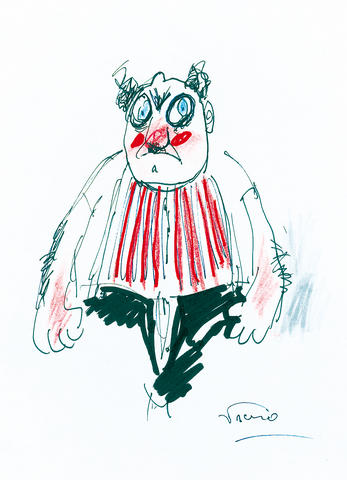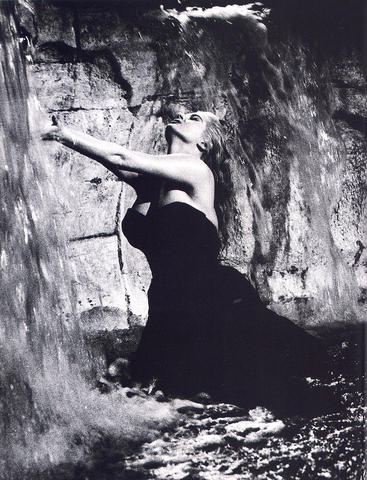After its series of critically acclaimed programs delving into the liaison between cinema and other art forms, the POP Cinema (國民戲院) turns to auteurship. Starting today, the cinema presents a retrospective of Federico Fellini's 23 films as well as an exhibition of around 100 film posters, sketches and costumes from Fellini's Roma and Amarcord, which are on loan from Italy's Fondazione Federico Fellini and Comune de Rimini. This is an experience unlikely to be duplicated for years to come.
Festival curator Wang Pai-chang (王派章) and his team spent the past two years tracking down the whereabouts of the copyright owner of each film, negotiating and obtaining permission to show them. The copyright fees and US$954 screening fee per film means that even if the program sees a full-house audience, the revenue couldn't cover the expenditure.
The festival is a rare chance for local audiences to revisit on the silver screen the whimsical world of Fellini, in which the sea, town squares, whores and the circus are combined with satire on Catholicism, a longing for innocence, revelry and debauchery to form surrealistic fantasies. The Italian director's works, known for being simultaneously approachable and elusive, were influenced by Italian neo-realism and abstractionism.

PHOTOS: COURTESY OF SPOT TAIPEI FILM HOUSE
Yet to scholar, critic and curator Wang, there exists another way of interpreting Fellini's works. It has nothing to do with reality or the representation of reality but with a constant yearning to flee from the concrete, and adventure into places foreign, even to the director himself.
Italian realism dominates Fellini's early works, such as The White Sheik and The Road, with clean-cut structures, strong sentiments and tragic endings. Later, the director moves into more mythical work with movies like Vitelloni and Nights of Cabiria in which the protagonist bids farewell to the sleeping townsfolk and embark on a journey into the unknown future.
His most enduring works, however, were those made toward the end of his career: films such as The Sweet Life in which Fellini's alter-ego Marcello Mastroianni plays out the archetypal character who doesn't want to grow up and is denied the chance to become a complete person.

Masterpieces such as 8 1/2, Fellini - Satyricon and Amarcord weave together a web of childhood memories, nostalgia, longing, fairy tales and dreams that are echoed in Fellini's last work The Voice of the Moon.
"The absolute in Absolute Fellini is, in fact, ironic since there is no sense of absoluteness and completeness in Fellini's films," Wang said. "I see in his works the director's desire to press the characters to become fully-formed individuals and refusal to give audiences tangible and concrete things, since the concrete means that there are traces to follow, a logic to be revolved around and from which a narration develops. Fellini adopts a nearly autocratic manner to expel purports, ends and thus becomes complete."
The immortal image of Fellini aside, his hand drawings on display speak of the significant aspiration of his caricatures. A comic artist before his career as a director, Fellini maintained the habit of sketching and drawing, creating visions long before scripts were written.

"Fellini creates imagery out of imagery. That is also why his films differ from the conventional narration as they just keep deviating outwardly," Wang said.
The exhibition will run from tomorrow through Oct. 14 on the 2nd floor at the Taipei Film House.



April 28 to May 4 During the Japanese colonial era, a city’s “first” high school typically served Japanese students, while Taiwanese attended the “second” high school. Only in Taichung was this reversed. That’s because when Taichung First High School opened its doors on May 1, 1915 to serve Taiwanese students who were previously barred from secondary education, it was the only high school in town. Former principal Hideo Azukisawa threatened to quit when the government in 1922 attempted to transfer the “first” designation to a new local high school for Japanese students, leading to this unusual situation. Prior to the Taichung First

The Ministry of Education last month proposed a nationwide ban on mobile devices in schools, aiming to curb concerns over student phone addiction. Under the revised regulation, which will take effect in August, teachers and schools will be required to collect mobile devices — including phones, laptops and wearables devices — for safekeeping during school hours, unless they are being used for educational purposes. For Chang Fong-ching (張鳳琴), the ban will have a positive impact. “It’s a good move,” says the professor in the department of

On April 17, Chinese Nationalist Party (KMT) Chairman Eric Chu (朱立倫) launched a bold campaign to revive and revitalize the KMT base by calling for an impromptu rally at the Taipei prosecutor’s offices to protest recent arrests of KMT recall campaigners over allegations of forgery and fraud involving signatures of dead voters. The protest had no time to apply for permits and was illegal, but that played into the sense of opposition grievance at alleged weaponization of the judiciary by the Democratic Progressive Party (DPP) to “annihilate” the opposition parties. Blamed for faltering recall campaigns and faced with a KMT chair

Article 2 of the Additional Articles of the Constitution of the Republic of China (中華民國憲法增修條文) stipulates that upon a vote of no confidence in the premier, the president can dissolve the legislature within 10 days. If the legislature is dissolved, a new legislative election must be held within 60 days, and the legislators’ terms will then be reckoned from that election. Two weeks ago Taipei Mayor Chiang Wan-an (蔣萬安) of the Chinese Nationalist Party (KMT) proposed that the legislature hold a vote of no confidence in the premier and dare the president to dissolve the legislature. The legislature is currently controlled